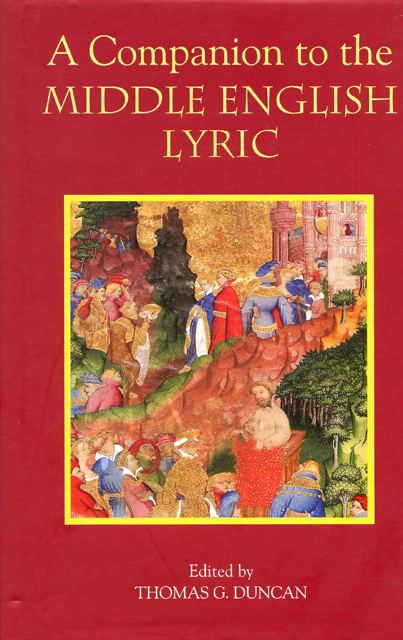Book contents
- Frontmatter
- Contents
- Acknowledgements
- Abbreviations
- Editorial Note
- Introduction
- 1 Middle English Lyrics and Manuscripts
- 2 Middle English Lyrics: Metre and Editorial Practice
- 3 The Love Lyric before Chaucer
- 4 Moral and Penitential Lyrics
- 5 Middle English Religious Lyrics
- 6 Middle English Courtly Lyrics: Chaucer to Henry VIII
- 7 The Middle English Carol
- 8 Political Lyrics
- 9 The Lyric in the Sermon
- 10 ‘Cuius Contrarium’: Middle English Popular Lyrics
- 11 Gender and Voice in Middle English Religious Lyrics
- 12 Lyrics in Middle Scots
- Bibliography of works cited
- Index of Manuscripts Cited
- General Index
- Index of Lyrics
10 - ‘Cuius Contrarium’: Middle English Popular Lyrics
Published online by Cambridge University Press: 23 March 2023
- Frontmatter
- Contents
- Acknowledgements
- Abbreviations
- Editorial Note
- Introduction
- 1 Middle English Lyrics and Manuscripts
- 2 Middle English Lyrics: Metre and Editorial Practice
- 3 The Love Lyric before Chaucer
- 4 Moral and Penitential Lyrics
- 5 Middle English Religious Lyrics
- 6 Middle English Courtly Lyrics: Chaucer to Henry VIII
- 7 The Middle English Carol
- 8 Political Lyrics
- 9 The Lyric in the Sermon
- 10 ‘Cuius Contrarium’: Middle English Popular Lyrics
- 11 Gender and Voice in Middle English Religious Lyrics
- 12 Lyrics in Middle Scots
- Bibliography of works cited
- Index of Manuscripts Cited
- General Index
- Index of Lyrics
Summary
In the most important anthology of the later Middle English secular lyrics, Rossell Hope Robbins's Secular Lyrics of the XIVth and XVth Centuries, the opening category, ‘Popular Songs’, contains a poem headed by Robbins ‘Abuse of Women’ which has the following epigraph as its burden:
Of all Creatures women be best:
Cuius contrarium verum est. (Robbins Sec., No. 38)
It seems strange at first glance to assign this poem in carol form to the ‘popular’ class; not only does its two-line burden contain a line of Latin but, moreover, this is a line which operates here as what Robbins neatly calls ‘the destroying burden’. Surely such features must relate to a learned tradition of satire, of the kind associated with the goliardic Latin poets of the High Middle Ages such as Walter of Châtillon. So what exactly does ‘popular’ mean in this context?
In the criticism of the Middle English lyrics which followed the pioneering editions by Brown and Robbins and the other canon-forming anthologies listed on the first page of Preston's Concordance, a good deal of the scholarly energy was expended on classification along these lines. The fundamental division, which has on the whole proved the most serviceable, is into ‘religious’ and ‘secular’. The second commonest division in those early discussions – one which cut across the religious-secular – was into ‘popular’ and ‘courtly’; indeed, despite the prior assortment of the field into ‘religious’ and ‘secular’ in the Oxford anthologies edited by himself and Carleton Brown, Robbins makes this categorisation even more fundamental: ‘These are the two big sub-divisions of Middle English poetry, the courtly and the popular – reflecting the stratification of medieval society’ (Robbins Sec., xxxiii). The alternative to ‘popular’ was not always ‘courtly’; sometimes it was something like ‘literary’ or ‘artistic’ or ‘sophisticated’ – but a division of which one pole was the ‘popular’ has come to seem indispensable.
Under scrutiny, however, the term ‘popular’ proves much more equivocal than might be expected. For one thing, though Robbins's ‘stratification of medieval society’ is a suggestive idea in this context, it has not been much pursued, even in his own introduction. Again, a quite different sense of the word had been employed in one of the most influential early discussions, the essay called ‘Some Aspects of Mediaeval Lyric’ appended by Chambers and Sidgwick to their attractive 1907 anthology, Early English Lyrics.
- Type
- Chapter
- Information
- A Companion to the Middle English Lyric , pp. 210 - 226Publisher: Boydell & BrewerPrint publication year: 2005



